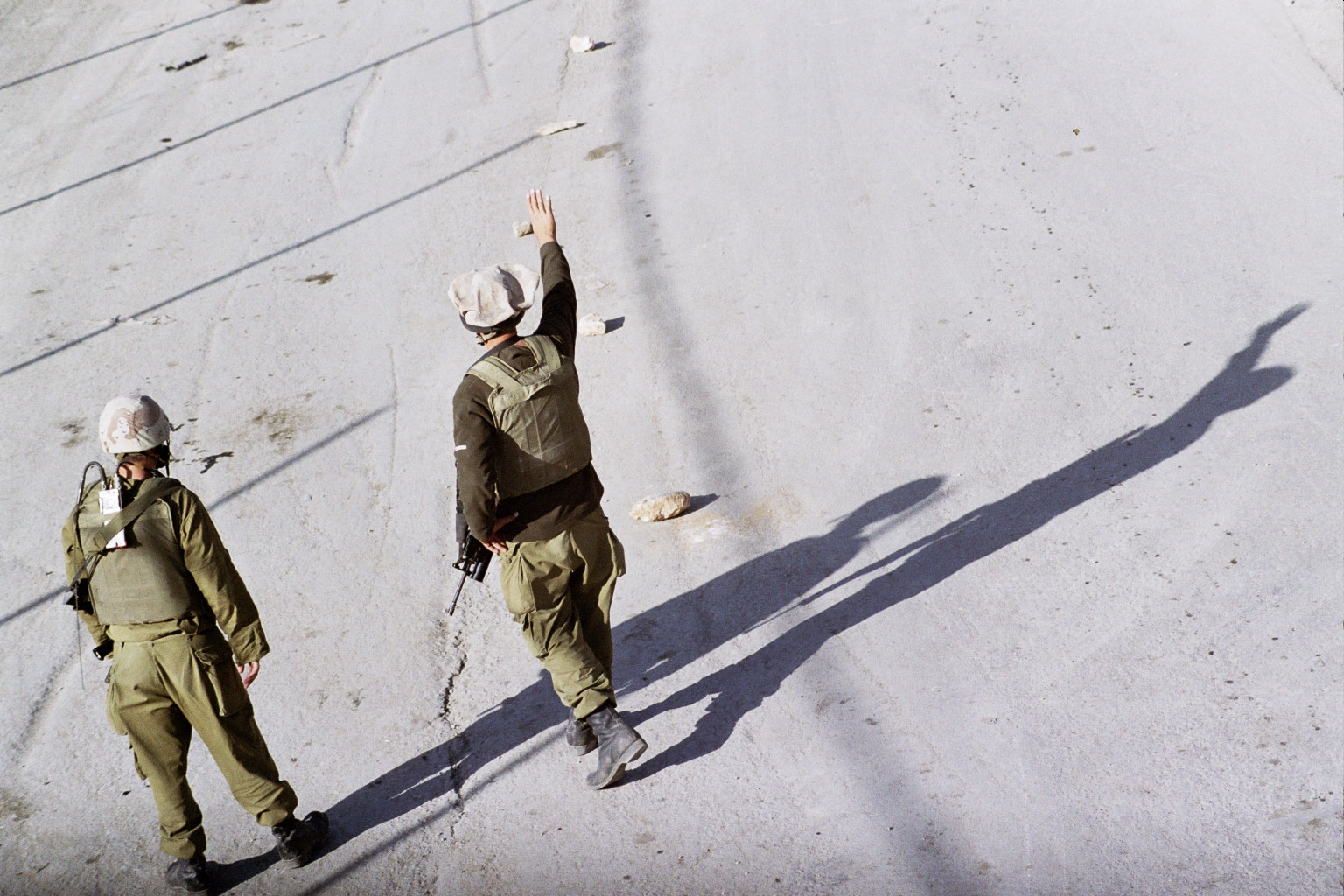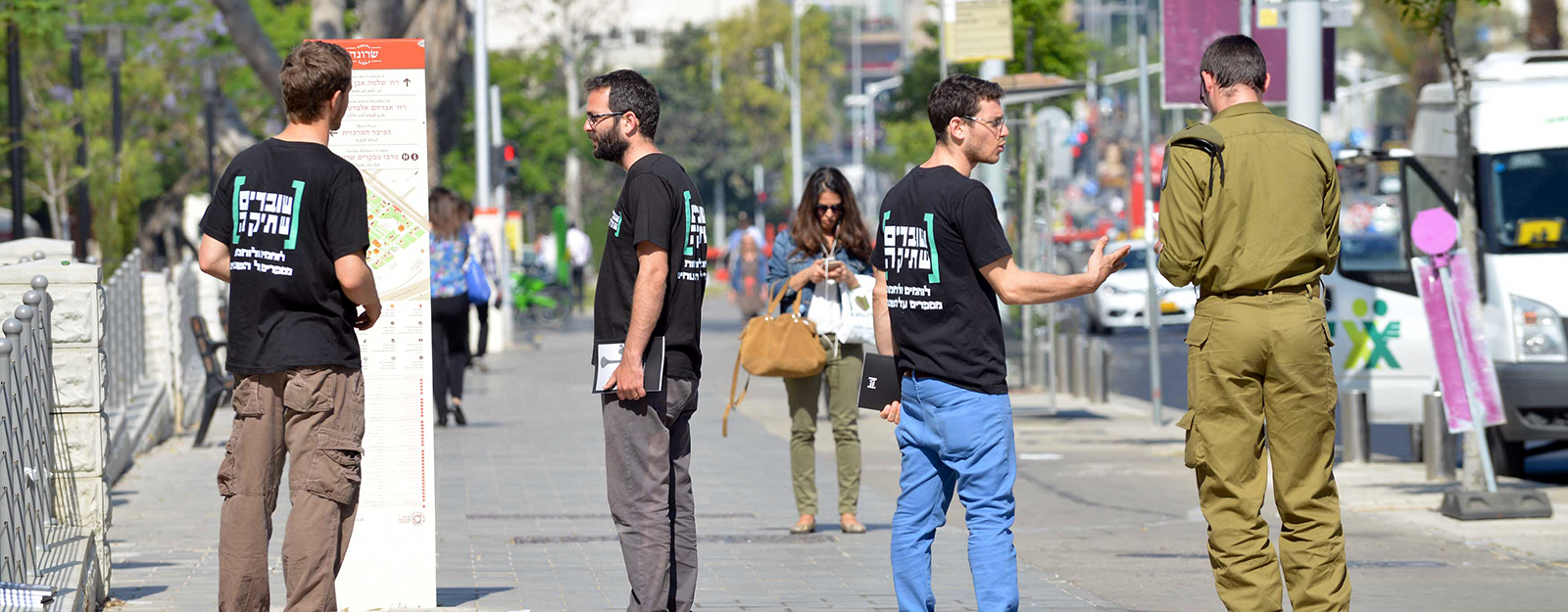In your outpost, were there areas that Palestinians were not allowed to approach? I remember an incident at Gefen. It was interesting. There was a feeling that everything was calm and quiet, I was on guard duty on a Saturday, everyone was asleep and some shepherds passed in front of me, they actually crossed through the white zone and the red zone. According to operational regulations, the white zone is an area they’re not allowed to enter and if they do, you have to shout out to them. The red zone is an area where, if they crossed the white zone and you shouted to them and they didn’t wait and continued to the red zone, you’re allowed to kill them.
Shoot to kill? I don’t think it’s in order to kill. I don’t remember the orders, I suppose it’s shooting at the legs, but of course it depends on what your intention is and what means you have. But I assume that it’s shooting at the legs, depending on whether he is a threat, in which case you can kill even at a longer range.
Was this before the [second] intifada? Yes, yes. So those flocks came on that Saturday. And I was half a year into my army service and didn’t know what to do. I called the war-room. On the radio, you’ve got the operational line and the administrative line. In the beginning, I used the administrative one, because it didn’t look good, those shepherds approaching. He didn’t get back to me and they were coming closer and I started getting a bit scared. I told the war-room runner and he didn’t send me anything, an atmosphere that nothing’s happening.
What range are we talking about? At Gefen, it was the Muwasi area.
What are the distances? What’s the white line and what’s the red line, what do they tell you at briefings? I think the red line is around 50 meters [from the post] and the white line is about 100 meters.
Are they marked? No, of course not. The red line is not an actual marking, but it’s marked by the post, which is higher up, so [the line] is where the hill starts.
A ground fold? Exactly. As soon as there’s a fold in the ground, it’s the red line, very simple. The white line is a bit further away. I don’t know whether it was necessary or not, because there weren’t any Palestinians coming there anyway. It was a post where Palestinians wouldn’t come anyway. The thing with the shepherds was a one-off, where they came into the post.
Into the area of the post? Yes, or even in the vicinity. The whole area of the post was our training ground. Training before ambushes and stuff like that. It was in the area around the post, which was so secure that there was no guarding of the training. All the training was done outside the fence, in open areas next to the post, and there was a guard who would have us in sight, but there was no guard watching the exercises themselves, further away. The atmosphere was total quiet.
What were the open-fire rules? White lines is shouting and red lines is shooting, I think…
Try to be as precise as possible. As far as I remember, it’s [shooting at] legs and below. It doesn’t seem logical to me that it would be simply shooting to kill. And I didn’t do it because it seemed ridiculous to me, and I also think any other soldier would not have shot to kill, although, on the other hand, if it was a terrorist, he could have very easily laid an explosive charge. Also, the fact is that the war-room runner came and made them go away, and there was no inquiry about my breaking procedure or not, and they’d got to 15 meters away from my guard post. I got a real fright from that, that someone got into my post and I’m afraid he can get closer, and also because I felt that there was some breach of regulations here and what will they do to me afterwards. I don’t even know if it was reported. If the war-room runner reported to the war-room on duty and if it was there into the operations log there. Sometimes, what did happen is that people would enter the Muwasi area and then we’d simply chase them away. They’d come, there was this whole area in the Muwasi that was out of bounds, and suddenly you’d see [them].
Who was not allowed in? Palestinians.
The Muwasi people? Yes. All kinds of specific areas that were defined as Israeli areas that Palestinians were not allowed to enter. We’d simply escort them out of there and tell them to beat it. The commander did. I wasn’t involved. I was a private. On patrols. Seeing someone with a horse or donkey carrying some farming equipment, I don’t even remember what it was, and simply chasing them away.
Was violence used? No, the Palestinians would just leave. There was no need to use violence.









 testimonies
testimonies  media & content
media & content 










 the white zone is an area they’re not allowed to enter and if they do
the white zone is an area they’re not allowed to enter and if they do 

 terms of use & privacy policy
terms of use & privacy policy